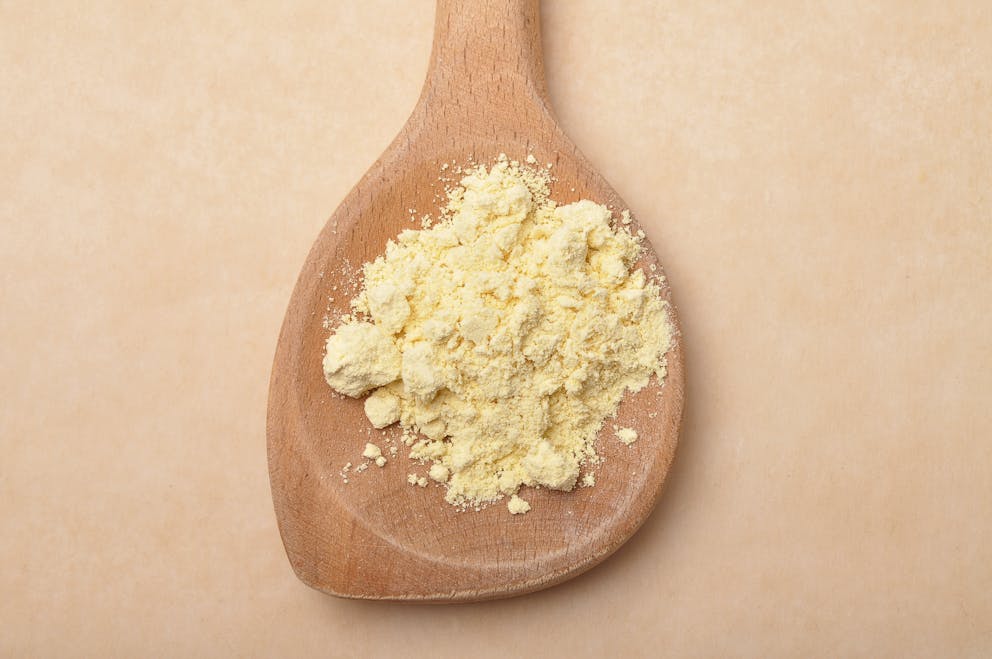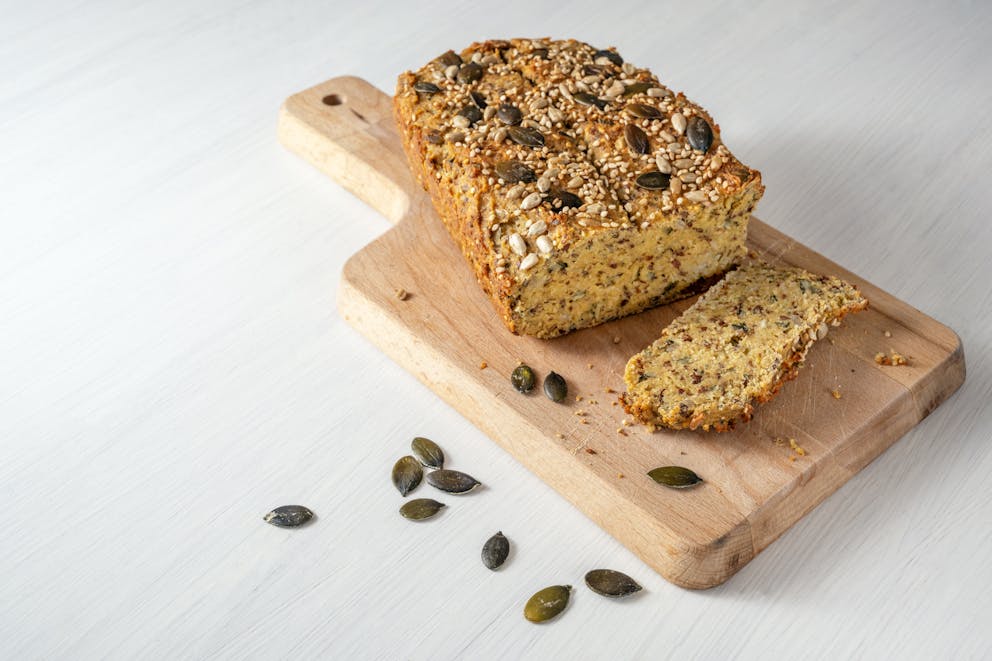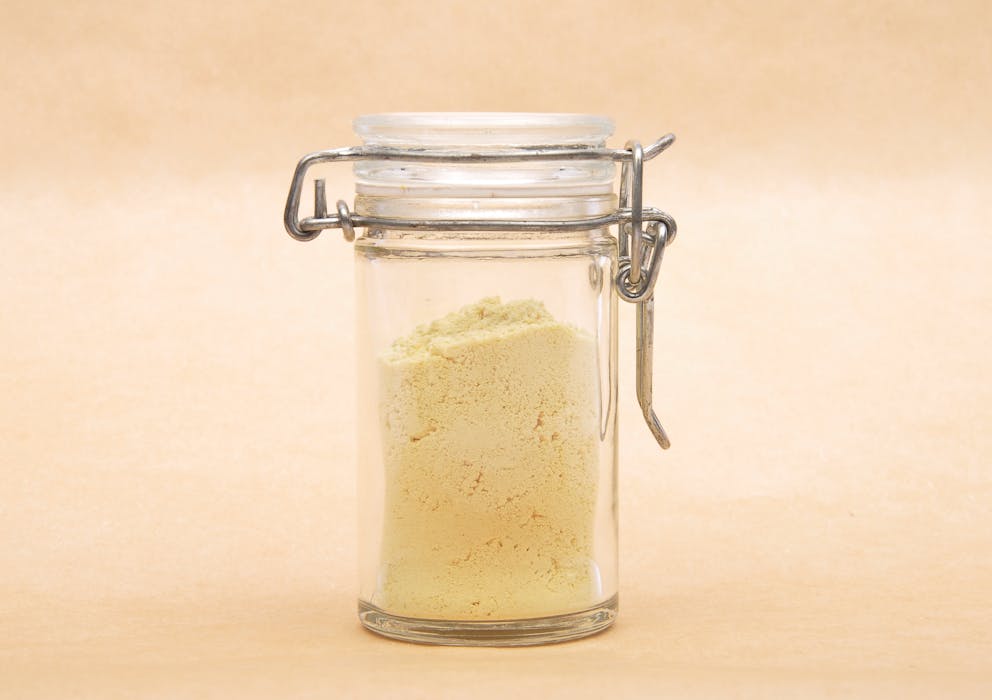What Is Lupin Flour?
Lupin flour is marketed as a wheat flour alternative to individuals with gluten intolerance and those following a low-carb diet. But what is lupin flour, and is it keto-friendly?
Lupin flour is a keto-approved flour made from lupin beans, which are low in carbs and rich sources of plant protein and fiber.
Learn how to use lupin flour and discover other gluten-free flours that you can safely incorporate into a keto diet without the risk of being kicked out of ketosis.

What is lupin flour?
Lupin flour is made by milling sweet lupin beans, also known as lupini beans, into a fine powder that resembles the texture of regular wheat flour.
Lupin beans belong to the legume family and are derived from the lupin plant, which is native to Mediterranean regions.
The use of lupin flour for culinary purposes dates back centuries. Ancient Greek and Roman civilizations used lupin flour to prepare various dishes, such as bread, porridge, and pastries.
The taste of lupin flour is generally described as nutty. However, its nuttiness isn’t as intense as that of traditional nut flours, making lupin flour a versatile alternative that won’t overpower the overall flavor profile of dishes.
Watch the video below to learn why you should incorporate lupin flour into a ketogenic diet.
Lupin flour nutrition facts
According to data published by the U.S. Department of Agriculture (USDA), one cup (100 grams) of lupin flour contains:
333 calories
6 g total fat
39 g protein
42 g total carbs
36 g fiber
6 g net carbs
In addition, lupin beans are a rich source of folate, potassium, and magnesium and are considered a complete protein as they offer all nine essential amino acids.
Because lupin beans are legumes, not a grain, lupin flour is gluten-free. This makes it a suitable wheat-flour alternative for individuals with Celiac disease, gluten sensitivity, or wheat allergy.
Is lupin flour keto-friendly?
Yes, lupin flour is an excellent low-carb flour perfect for keto baking.
A quarter cup of lupin flour contains less than two grams of net carbs, which won’t impact your blood sugar or insulin levels, keeping your metabolism in fat-burning mode.
Although lupin flour isn’t a significant source of fats, it’s high in protein and a rich source of dietary fiber, making it an excellent addition to a nutritious low-carb diet such as Healthy Keto®.

Lupin flour uses
Because of its increasing popularity, you won’t find it challenging to find lupin flour in well-stocked supermarkets and health food stores.
This low-carb flour can be combined with other keto alternatives, such as almond or coconut flour, to create a wide range of low-carb breads.
Lupin flour can also be used to make keto pizza crusts, tortillas, and crackers while serving as an excellent alternative to cornstarch for thickening soups, sauces, and stews.
Starch-free flour, such as lupin flour, can be used in various pasta recipes, including gluten-free and low-carb spaghetti, fettuccine, and penne dishes.
Those with a sweet tooth can use lupin flour to bake keto-friendly brownies, pie crusts, cakes, and cookies.

Possible downsides of lupin flour
Although lupin flour is generally well tolerated by most people, it contains phytic acid and lectins, which can cause nutrient deficiencies and digestive issues.
Phytic acid is classified as an antinutrient, meaning it can bind to certain minerals, significantly reducing their intestinal absorption and increasing the risk of nutrient deficiencies.
A study published in the Journal of Food Science and Technology examined phytic acid’s effects on nutrient status. The authors summarized, “Phytic acid can bind to minerals including zinc, iron, magnesium, calcium, and manganese, making them unavailable for absorption.”
Lectins are a group of plant proteins that can interfere with the normal functioning of cells lining the gastrointestinal tract. This can impair digestion and trigger intestinal symptoms such as abdominal pain, bloating, and diarrhea.
“Not everyone experiences digestive distress when consuming lupin flour,” explains Dr. Berg. “However, individuals who regularly use lupin flour as a gluten-free wheat alternative may be at increased risk of developing lectin sensitivity.”
In addition, lupin beans have been found to interact with blood-thinning medication. It’s crucial that individuals with blood clotting disorders discuss the use of lupin flour with a healthcare provider to minimize the risk of side effects.

Other keto-friendly flour alternatives
In addition to lupin flour, there are other keto-friendly flours that are perfect for baking and cooking on a ketogenic diet.
These five keto flours are low in carbs and won’t interfere with ketosis.
1. Coconut flour
A quarter cup (28 grams) of coconut flour contains around four net carbs, making it a keto-approved alternative to high-carb wheat flour.
You can use coconut flour to create low-carb and gluten-free dishes such as keto coconut tortillas, bread, pancakes, muffins, and savory recipes, including coconut-crusted chicken or fish.
2. Almond flour
Almond flour is the best for baking as it’s low in carbs and a rich source of healthy fats, fiber, vitamin E, and essential minerals.
Almond flour contains less than three net carbs per quarter cup, which won’t significantly raise blood sugar levels or interfere with fat-burning.
This keto-approved nut flour works great in cakes and is an excellent low-carb alternative to traditional breadcrumbs.
3. Pecan flour
Pecan flour has the same amount of carbs as almond flour, making it another keto-friendly flour alternative that can be used in many low-carb recipes.
Its smooth texture and nutty taste make it a perfect flour for creating fluffy low-carb pancakes and keto-friendly cakes while also serving as an excellent thickening agent.

4. Flax meal
Flax meal, also known as ground flaxseeds, is a fine powder made by milling flaxseeds.
Although flaxseeds naturally contain some carbs, the net carb count of flax meal is close to zero due to its high fiber content.
Ground flaxseeds are a versatile ingredient that adds a pleasant nutty flavor to various keto recipes, such as flaxseed bread, granola bars, muffins, or wraps.
In addition, flaxseeds are an incredibly rich source of health-promoting omega-3 fatty acids. Research published in Nutrients suggests that flaxseed consumption enhances brain function and gastrointestinal health while lowering the risk of heart disease and cancer.
5. Sunflower seed flour
Sunflower seed flour contains only around two net carbs per quarter cup. Similar to other keto flour, it has a mild nutty flavor that works well for keto baking and in low-carb waffle recipes.
Regularly consuming sunflower seeds can offer several health benefits due to their impressive nutritional profile. Sunflower seeds are rich sources of monounsaturated and polyunsaturated fats, which promote heart health and reduce the risk of cardiovascular diseases.

Key takeaways
What is lupin flour, and is it keto-friendly?
Lupin flour is a gluten-free and low-carb flour made from lupin beans. It’s rich in protein and fiber, making it a popular choice for those following a ketogenic diet.
This keto-approved wheat flour alternative has a fine texture and a mild nutty flavor, which works
well in various low-carb recipes, such as keto bread, pizza crusts, cakes, pancakes, and muffins.
FAQ
1. What is lupin flour made out of?
Lupin flour is made from the seeds of the lupin plant, which are known as lupin beans or lupini beans.
2. Is lupin flour healthy?
Lupin flour is a rich source of essential amino acids, dietary fiber, folate, potassium, and magnesium, which help maintain vital physiological functions and promote a healthy body.
It’s also gluten-free and low in carbs, making it an excellent option for preparing gluten-free foods that are suitable for a ketogenic diet.
3. What does lupin flour taste like?
Lupin flour has a mild nutty flavor and a slightly earthy taste. It’s an excellent alternative to other flours, such as coconut or almond flour, as it has a more neutral taste and doesn’t overpower the flavor of their dishes.
4. Is lupin flour better than almond flour?
Both lupin and almond flour are gluten-free, low-carb wheat flour alternatives. While some people choose lupin flour for its mild flavor and higher protein content, others prefer almond flour to bake bread and cakes due to its moisture-retaining properties.
5. Can lupin flour replace all-purpose flour?
Lupin flour can be used as a substitute for all-purpose flour. However, it has a different texture, and it may be necessary to adjust the liquid content of recipes when replacing all-purpose flour with lupin flour.
Sources
Previous blog
Why Does a Fatty Liver Have No Symptoms?Next blog
How Much is Too Much CoffeeTags

Popular
08/21/2024
55.7K views
02/23/2025
46.8K views
11/18/2024
281.1K views
03/18/2024
11/21/2022




